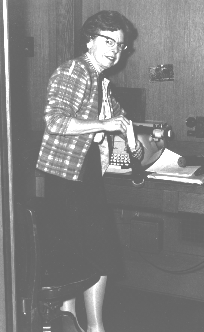Page 25
[Begin Tape 2, Side A]
Moulton: I got a telegram from the War Department asking me when I wanted to come to work. Gee, they had everything all settled right there. I remember it was unclear to meóI think some people were coming to Washington just on a temporary basis and some were notóso I wanted to be sure I wasn't giving up my job and coming on a temporary basis. I guess I probably wired them or wrote them, wired them probably, and said, "Is this a permanent job?" And so they let me know that it was. I remember after I got here somebody said, "Oh, you're the one that wanted to know if it was permanent." [Laughter.] I suppose, you know, permanent for an indefinite period.
But anyway, I got to the Ordnance Department. I knew one Simmons graduate who was already here who was in my class so I got in touch with her and she met the train. I came down on the trainóyou didn't fly places in those daysóat least I didn't. So I came on the train and she came over to Union Station to meet me. She had arranged for me to stay in one of the boarding houses. It was over on 18th Street near Dupont Circle. She was living with two other people so she couldn't take me in. So I had this room over there with two women. I had a third of a closet to keep my things in, and, I think, maybe one bureau drawer or something. So I lived that kind of life for a while.
Kasper: This was 1940, wasn't it? Is that when we're talking about?
Moulton: This was 1940, right. I remember trying to get to work. I think the first of my job in Ordnance was down in one of those temporary buildings on Constitution Avenue that have since been torn down. They were temporary in World War I and they lasted quite a long time. So I was having to find my way down there the first day and I remember walking around Dupont Circle trying to find a way out of it to get down to Constitution Avenue. [Laughter.]
But anyway, I got there and I worked as a secretary in Ordnance at Grade 2 for $1,440.00 a year. And Ordnance, at the timeóyou see, we weren't in the war yetóthey were taking stock of all the weapons and ammunition in the arsenals throughout the country because people were obviously looking ahead to what might happen. So I was a secretary there, for perhaps a year, I guess.*
Then I arranged a transfer to the Public Relations Office, in another secretarial jobóbut see I was getting closer and closer [Laughter].
______________________ * Later Ms. Moulton added: I worked directly for Captain Waldo E. Laidlaw, but also for his superior officer, Colonel John W. Coffey, who became Chief Ordnance Officer of the European theater in World War II and was awarded the Legion of Merit. Colonel Coffey lost his life overseas.

